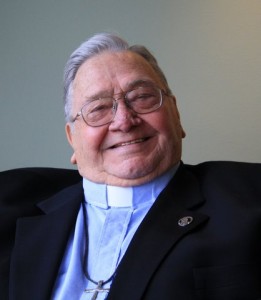Antioch, Ephesus play key role
By the Rev. Canon Don Beatty
 At the conclusion of his second missionary journey, Paul returned to Jerusalem to report on his progress to the mother church. From there he made his way to Antioch in Syria – the same Syria that is so much in the news today.
At the conclusion of his second missionary journey, Paul returned to Jerusalem to report on his progress to the mother church. From there he made his way to Antioch in Syria – the same Syria that is so much in the news today.
Antioch was the mission headquarters of the early church. It was here that Paul was recharged and renewed for his mission journeys. He seemed to have stayed in Syria for about a year before setting out on his next journey. We date this third journey between 53-57 CE.
The third missionary journey, as with the second, set out overland through Tarsus and into the provinces of Galatia and Phrygia. Paul and the team revisited the churches that had been established in the first journey about five years earlier, strengthening and encouraging them. No new places were visited on this third journey.
In Acts 19, the team came to Ephesus, the capital of Asia. Here Paul met the disciples who had been baptized with John’s baptism but did not know the Holy Spirit. These were likely Jews who had been converted by disciples of John the Baptist; they had been baptized with the baptism of washing and cleansing in preparation for the coming Kingdom. (There was some competition between the disciples of John and Jesus in the first century.)
As Paul baptized them and laid hands on their heads, they began to prophesy and speak in tongues, demonstrating the gifts of the Holy Spirit for empowering the newly converted. Note that laying-on-of-hands was an apostolic act. Paul was claiming his role as an apostle here as elsewhere in the New Testament.
In Ephesus, Paul went first to the synagogue, as was his custom. He seemed to have preached there for three months. Eventually, opposition arose in the synagogue, and Paul and the Christians moved to the lecture halls of Tyrannus. These lecture rooms were not occupied during the heat of the day, so Paul and the Christians were allowed to use them to teach about the faith during those hours. Some ancient writers suggested that this would have been between 11 a.m. and 4 p.m.
Paul and his team were in Ephesus for more than two years, his longest stay in any one place during the missionary trips. It was reported in the Acts that everyone in the city had a chance to hear the Gospel (Acts 19:10).
Paul had much success in Ephesus. He sent Timothy and Erastus on to Macedonia to prepare for his forthcoming visit there. Erastus is mentioned in Romans 16:23. After causing a riot in Ephesus, Paul moved to Macedonia, strengthening and encouraging the young churches throughout the region. Finally, he arrived in Greece and stayed in Corinth for three months. This was probably where Paul wrote his most important epistle – the epistle to the Romans. It had been Paul’s earnest desire to go to Rome. He wrote to prepare the Christians there for his expected visit, and to prepare them to become another mission centre for his further mission to the west. You will find this part of Paul’s story in Chapter 19 of the Acts of the Apostles.
Did Paul make it to Spain? We will talk about this possibility in a later column. He did, however, arrive in Rome, but as a prisoner in chains. (More about that trip will be in another column.)
At this point in our dialogue, we need to spend some time looking at his writings. Chronologically, the order would probably be: 1 and 2 Thessalonians, Galatians, 1 and 2 Corinthians, Romans, the prison letters (Philemon, Colossians, Ephesians and Philippians) and finally the pastoral letters (1 and 2 Timothy, Titus). Some have questioned whether these letters were actually written by Paul or by latter scribes. This is especially true of the pastoral letters and the letter to the Ephesians.
We will examine the authorship issues when we discuss each epistle, and we will try to determine the pastoral concerns that were being addressed with each letter. Remember, Paul was usually responding to a pastoral or theological question expressed to him by one of the mission churches. His letters are primarily pastoral in nature.
Remember also, we possess only one side of the discussion. It is a bit like listening in as your spouse talks on the telephone. You only hear the one side of the conversation. You can try and determine the other parts of the discussion, but this is not always possible. Enjoy the dialogue.
The Rev. Canon Don Beatty is an honorary assistant at St. Luke, Dixie South, Mississauga.